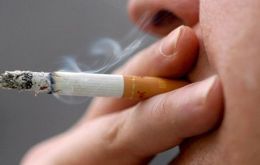MercoPress. South Atlantic News Agency
Tag: tobacco
-
Wednesday, November 17th 2021 - 08:58 UTC
“Tobacco industry used Covid-19 pandemic to build influence with governments”, WHO report

The fourth WHO global tobacco trends report release shows that there are 1.30 billion tobacco users globally compared to 1.32 billion in 2015. This number is expected to drop to 1.27 billion by 2025. Sixty countries are now on track to achieving the voluntary global target of a 30% reduction in tobacco use between 2010 and 2025: two years ago only 32 countries were on track.
-
Wednesday, September 15th 2021 - 09:13 UTC
Argentina's August inflation set at 2.5% by Indec

Argentina's Consumer Price Index (CPI-Cost of Living) rose 2.5% during August and fell below 3% in July, according to a report from the National Institute of Statistics and Census (Indec) released Tuesday.
-
Friday, May 29th 2020 - 08:18 UTC
WHO alerts on tobacco industry exploitation of children and young people

The World Health Organization is launching on Friday a new kit for school students aged 13-17 to alert them to the tobacco industry tactics used to hook them to addictive products. Every year the tobacco industry invests more than US$ 9 billion to advertise its products.
-
Friday, December 20th 2019 - 09:21 UTC
US Congress raised minimum age to buy tobacco and e-cigarettes from 18 to 21

The US Congress voted on Thursday to raise the minimum age to buy tobacco and e-cigarettes from 18 to 21 across the country, a move intended to stem the rising tide of youth vaping.
-
Friday, May 31st 2019 - 09:39 UTC
World No Tobacco Day: the damage tobacco causes to lung health

On World No Tobacco Day (31 May), the World Health Organization is highlighting the damage tobacco causes to lung health: over 40% of all tobacco-related deaths are from lung diseases like cancer, chronic respiratory diseases and tuberculosis. WHO is calling on countries and partners to increase action to protect people from exposure to tobacco.
-
Friday, May 31st 2019 - 09:20 UTC
Brazil 's Attorney General sues Philips Morris and British American Tobacco

Brazil is following the U.S. and Canada in taking on Big Tobacco, becoming the first country in Latin America to sue cigarette makers over the financial toll of smoking. Brazil’s attorney general’s office, known as the AGU, last week sued the two largest cigarette manufacturers in the country, Phillip Morris International and British American Tobacco, to cover the costs of treating patients with 26 tobacco-related diseases over the past five years.
-
Tuesday, March 5th 2019 - 09:55 UTC
Trump tightens trade embargo on Cuba; retaliation for Havana's support for Maduro

The Trump administration announced Monday that it is tightening the six-decade trade embargo on Cuba by allowing lawsuits against Cuban companies using properties confiscated after its 1959 revolution.
-
Thursday, February 7th 2019 - 10:05 UTC
Manufacturing in Argentina was 5% down during 2018

Manufacturing performance in Argentina during 2018 was one of the worst since the 2001/02 collapse and melting of the country's economy according to the latest release from the stats office, Indec. Manufacturing dropped 14.7% in December compared to the same month in 2017, ending 2018 with an overall decrease of 5%.
-
Friday, January 4th 2019 - 08:54 UTC
Argentine industrial production plummeted 13.3% last October

Argentina industrial production plummeted 13.3% in October 2018 after plunging 6.8% in the previous month. It was the seventh straight drop and the sharpest decline since June 2002, as all categories fell excluding tobacco (+1.5%) and basic metals (+4.1%).
-
Friday, June 29th 2018 - 08:21 UTC
The Protocol x Eliminate Illicit Trade in Tobacco Products is live

On 27 June 2018, the conditions for the entry into force of the first legally binding instrument adopted under the WHO FCTC were met, paving the way to eliminate illicit trade of tobacco products
